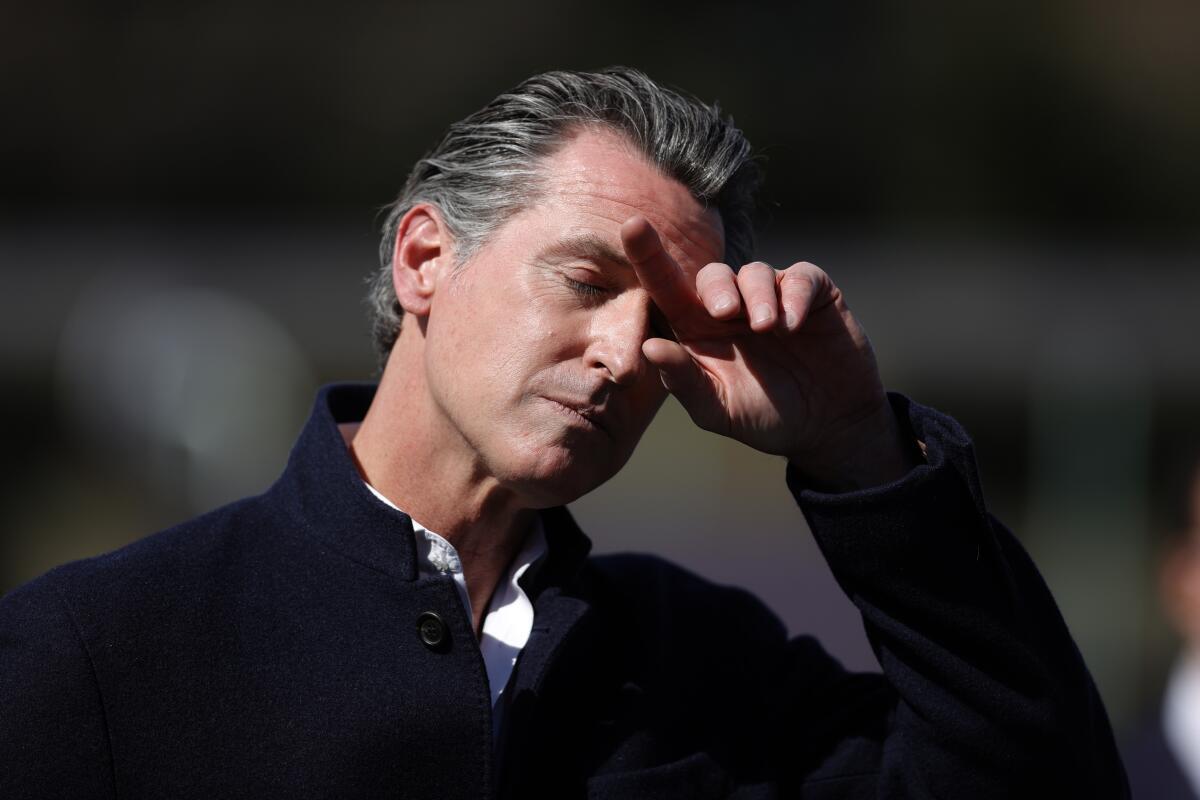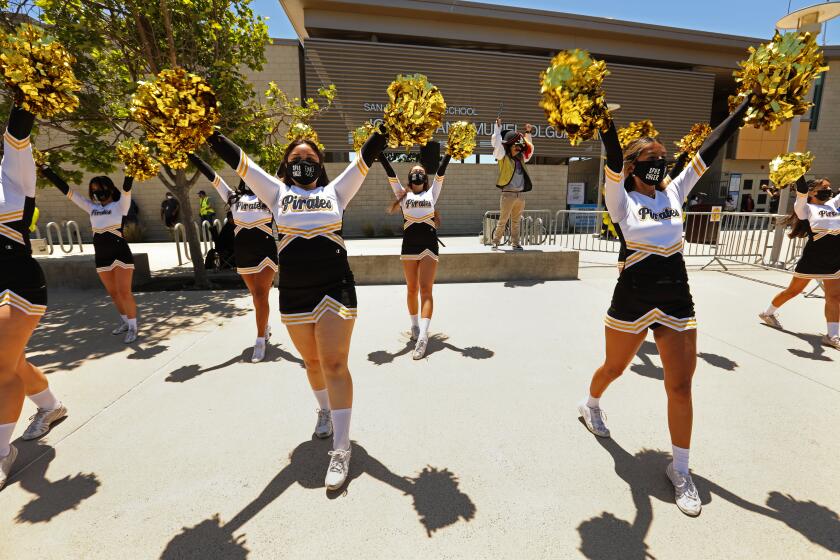Essential Politics: California’s reopening confusion

- Share via
This is the June 7, 2021, edition of the Essential Politics newsletter. Like what you’re reading? Sign up to get it in your inbox three times a week.
The events of the last few days raise the question: In eight days, will Californians mistakenly believe that the COVID-19 pandemic is over? After all, Gov. Gavin Newsom has promised a “full reopening” of the state on that date.
Get our L.A. Times Politics newsletter
The latest news, analysis and insights from our politics team.
You may occasionally receive promotional content from the Los Angeles Times.
In reality, the changes taking place on June 15 are only the beginning of California’s journey back to normality. But the facts have been blurred by imprecise messages, some delivered by Newsom, repeated on social and news media platforms for weeks.
The simmering issue boiled over late last week, leaving the governor’s administration scrambling to explain why the “reopening” will not bring an end to the state’s emergency declaration.
Newsom: The emergency continues
It began at the end of a campy event on Friday, designed to look like a classic TV game show with Newsom as the host selecting the initial $50,000 winners of California’s vaccine lottery.
After posing with an oversized check as confetti rained down on the studio, Newsom opened up the event to questions from the news media. And he seemed annoyed that reporters wanted to change the subject.
Here are five things to expect as L.A. County fully reopens after COVID-19 restrictions.
One journalist asked whether his promise of “reopening” June 15 would include the cancellation of California’s pandemic state of emergency.
“The emergency remains in effect after June 15,” Newsom said, then offering this explanation: “Because we’re still in a state of emergency, this disease has not been extinguished. It’s not vanished.”
For starters, the governor’s epidemiological standard — the full eradication of COVID-19 — is probably unreachable for the foreseeable future. But what stood out most to observers was the admission that Newsom’s promised “reopening” won’t bring to an end the broad powers he’s exercised over the last 15 months.
Republicans, who dismissed the vaccination cash as part of a political ploy to help lessen Newsom’s chance of being recalled by voters, quickly pivoted to the reopening confusion.
“California will NOT fully reopen on June 15 as Gavin Newsom had previously indicated,” former San Diego Mayor Kevin Faulconer, a recall candidate, wrote on Twitter. “Other states have been safely open for months, but Newsom refuses to follow the science. It’s time to recall him.”
The issue ultimately eclipsed the day’s vaccine sweepstakes news and now threatens to inflict lasting political damage.
So let’s clear up the confusion.
The reopening and the emergency order
A top advisor to Newsom, who spoke to The Times on background, laid out the complicated nature of dismantling California’s pandemic emergency rules — an explanation that hasn’t been clearly conveyed to either the media or the public.
On March 4 of last year, the governor declared a state of emergency that broadened his authority to respond to the COVID-19 crisis. States of emergency are frequently used as a response to wildfires or natural disasters and are one of the tools that ensure quick access to resources and cash, including disaster funds provided by the federal government.
But unlike other incidents, this emergency declaration was not for a singular event. Instead, it became the foundation for almost five dozen executive orders Newsom issued over the intervening months, spanning a variety of pandemic-related issues.
To cancel the declaration while those executive orders are still needed, the advisor said, would be like yanking out the bottom blocks of the tower that players build in the popular game Jenga. Many of the executive orders legally depend on the existence of the state of emergency, and the governor’s advisor said it will probably be the last thing rescinded, not the first.
It’s also important to note that states of emergency aren’t always canceled when immediate dangers subside. Proclamations made in the wake of the devastating Woolsey and Camp fires, for example, remain operational to ensure the completion of recovery efforts and continued federal reimbursement for some costs.
Back to the Jenga analogy: The Newsom administration plans to remove the blocks (executive orders) as conditions improve, a sequenced removal of the scaffolding built on top of the emergency order.
Which brings us to June 15 and the rescission of the state’s “Blueprint for a Safer Economy” that placed restrictions on activities and businesses using a multicolored county tier system. All but four California counties are now in either the moderate or minimal risk categories.
Newsom has insisted that removing those restrictions will “fully reopen our economy.” But even that seemed uncertain on Thursday, after confusion arose over new workplace mask rules issued by a standards board of California’s Division of Occupational Safety and Health.
And it’s not just average Californians who have been uncertain about what to expect on June 15.
Local government officials asked the Newsom administration in May whether this month’s reopening would trigger an end to an executive order allowing local agencies and boards to conduct virtual public meetings. Ana Matosantos, the governor’s Cabinet secretary, wrote to local representatives last week that the administration envisions an “orderly return” to normal practices “at the earliest possible date.”
Taken together, the misunderstandings and miscues have created a policy and political quandary, possibly complicating the efforts of businesses and local officials to answer questions about what’s allowed, when it’s allowed and why.
The clamor also threatens to end Newsom’s recent streak of good news, from improving vaccination rates to encouraging poll numbers about his chances to beat back a recall election.
We’ll see whether the governor recalibrates his message in light of last week’s criticisms, perhaps focusing less on a single day of dramatic change and more on what sounds like a multistep process to loosen California’s pandemic rules, one step at a time.
Huge stakes in assault weapons ruling
One of Newsom’s signature issues has been thrust back into the spotlight by a federal judge, who issued a blistering rebuke Friday of the state’s most high-profile gun control law.
U.S. District Judge Roger Benitez ruled that California’s 30-year-old ban on assault weapons is unconstitutional, likening the AR-15 semiautomatic rifle to a Swiss Army knife as “good for both home and battle.”
The ruling came in response to a lawsuit filed in August 2019 by pro-gun groups and was stayed by Benitez while California officials filed an appeal — which they will do this week, after angrily denouncing the tone and substance of the sweeping ruling.
“There is no sound basis in law, fact, or common sense for equating assault rifles with Swiss Army knives — especially on Gun Violence Awareness Day and after the recent shootings in our own California communities,” state Atty. Gen. Rob Bonta said in a statement Friday.
Recall attorney and judge are former law partners
Perhaps no decision was more consequential to the success of qualifying a recall petition against Gov. Newsom than a Sacramento judge’s decision last year to allow extra time for the governor’s critics to gather voter signatures in light of COVID-19 restrictions on public activities.
Known to few, though, was that the judge in the case was once a law partner with the attorney hired by the effort’s proponents to plead their case.
Judge James Arguelles and Bradley Benbrook were attorneys at the Sacramento law firm of Stevens, O’Connell & Jacobs before 2010 and, according to federal court records, the two served as co-counsel on at least two cases.
Scott Cummings, a professor of legal ethics at the UCLA School of Law, said Arguelles probably should have recused himself from the case given his history with Benbrook. But Cummings emphasized that “judicial ethics is one of those murky areas” in the law, in part because judges have past lives as lawyers, and said he wasn’t confident that Arguelles did anything improper.
Still, if it’s determined that a judge committed an ethics violation, that could potentially provide a “basis for reopening and overturning the case,” Cummings said.
Enjoying this newsletter? Consider subscribing to the Los Angeles Times
Your support helps us deliver the news that matters most. Become a subscriber.
National lightning round
— Vice President Harris’ trip to Central America is her most high-profile act yet on the first international assignment President Biden gave her, in March, to tackle the root causes of migration from the region.
— West Virginia Sen. Joe Machin III said Sunday that he will not vote for the largest overhaul of U.S. election law in at least a generation, defying his party and the White House and virtually guaranteeing the legislation’s failure.
— Biden on Friday rejected the latest counteroffer on infrastructure spending from a group of Senate Republicans as far too little, leaving the bipartisan talks at what looks to be an unresolvable impasse.
— The Justice Department said Saturday that it no longer will secretly obtain reporters’ records during leak investigations, a policy shift that abandons a practice decried by news organizations and press freedom groups.
— With the release of a trove of Dr. Anthony Fauci’s emails, Republicans’ attacks on the nation’s top government infectious-diseases expert have gone into overdrive.
— Fox News declined to broadcast an ad Sunday about the violence that law-enforcement members faced as they tried to stop the Jan. 6 insurrection at the U.S. Capitol, according to the creators of the political commercial.
— Former President Trump on Saturday pushed Republicans to support candidates who are loyal to him in next year’s midterm elections.
— Democrats face an uphill fight to keep their majority in Congress and hope quick action on Biden’s agenda will help them to defy historical trends that put the president’s party at a disadvantage.
— A conservative talk radio host once backed the Arizona GOP election recount. Now he’s warning Republicans against it.
— Michaela Kennedy-Cuomo, the daughter of New York’s governor, used a social media post Thursday to share her “queer identity” and call for allies to speak up against homophobia.
Today’s essential California politics
— Democratic leaders of the California Legislature have unveiled a state budget blueprint that would boost public schools and small businesses beyond the levels in a proposal made last month by Newsom.
— California Assembly members declined Thursday to vote on a bill that would have awarded “hero pay” to healthcare workers who helped steer the state through the pandemic, effectively killing the $7-billion effort for the year.
— The leadership body of the Los Angeles teachers union is expected to vote in September on a resolution that would urge the U.S. government to end all aid to Israel, sparking debate and diverting some of the union’s focus from post-pandemic education issues.
— California’s top court weighs overturning hundreds of death penalty sentences.
— A federal judge has prohibited Bank of America from freezing accounts for California unemployment benefits based solely on an automated fraud filter.
Stay in touch
Keep up with breaking news on our Politics page. And are you following us on Twitter at @latimespolitics?
Did someone forward you this? Sign up here to get Essential Politics in your inbox.
Until next time, send your comments, suggestions and news tips to [email protected].
Get the L.A. Times Politics newsletter
Deeply reported insights into legislation, politics and policy from Sacramento, Washington and beyond. In your inbox twice per week.
You may occasionally receive promotional content from the Los Angeles Times.





